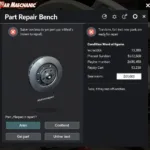Summer’s here, and your car’s AC is blowing hot air? Don’t sweat it! While some air conditioning problems require a professional touch, many can be tackled with a little DIY spirit. This guide will walk you through common car AC issues, how to diagnose them, and potential fixes you can handle in your own garage.
Understanding Your Car’s Air Conditioning System
Before diving into repairs, it’s crucial to understand the basic components of your car’s AC:
- Compressor: This is the heart of the system, compressing and circulating refrigerant.
- Condenser: Located at the front of your vehicle, it cools the refrigerant, transforming it from a gas to a high-pressure liquid.
- Evaporator: Positioned inside the dashboard, it converts the liquid refrigerant back into a gas, absorbing heat from the cabin air in the process.
- Receiver/Drier: This component stores refrigerant and removes moisture from the system.
- Expansion Valve/Orifice Tube: This regulates the flow of refrigerant into the evaporator.
Common Car Air Conditioning Problems and DIY Solutions
Here are some common AC issues you might encounter and possible DIY solutions:
1. AC Blowing Warm Air
- Possible Causes: Low refrigerant level, a leak in the system, a faulty compressor, or a malfunctioning electrical component.
- DIY Checks and Fixes:
- Check Refrigerant Levels: You can purchase a DIY AC recharge kit at most auto parts stores. If the refrigerant is low, carefully follow the kit’s instructions for recharging. Remember, refrigerant is hazardous, so proceed with caution.
- Inspect for Leaks: A visual inspection might reveal oily residue around hoses and connections, indicating a leak.
- Consider Electrical Components: Check fuses and relays related to your AC system. A blown fuse could be a simple fix.
Expert Tip from John Miller, ASE Certified Master Technician: “While recharging your AC system might seem straightforward, it’s crucial to address the root cause of the low refrigerant. Ignoring a leak can lead to more significant problems down the road.”
2. Weak Airflow
- Possible Causes: A clogged cabin air filter, a malfunctioning blower motor, or a problem with the blend door actuator.
- DIY Checks and Fixes:
- Replace the Cabin Air Filter: This is usually a simple task located behind the glove box or under the hood. Refer to your owner’s manual for the exact location.
- Listen to the Blower Motor: Turn your AC to its highest setting. If you hear unusual noises or the airflow remains weak, the blower motor might be failing.
3. AC Making Noises
- Possible Causes: A worn-out compressor clutch, a failing blower motor bearing, or debris in the blower motor.
- DIY Checks and Fixes:
- Identify the Noise: Different noises can point to different issues. A rattling could indicate a loose part, while a grinding might suggest a failing bearing.
- Inspect the Blower Motor: If the noise seems to be coming from the dashboard, the blower motor might need cleaning or replacement.
4. AC Smells Bad
- Possible Causes: Mold or bacteria buildup on the evaporator.
- DIY Checks and Fixes:
- Use an Evaporator Cleaner: Several AC evaporator cleaner products are available at auto parts stores. Follow the instructions on the cleaner to eliminate odors.
Expert Tip from Sarah Chen, Automotive HVAC Specialist: “Regularly replacing your cabin air filter not only improves airflow but also helps prevent mold and bacteria buildup, keeping your AC smelling fresh.”
When to Call a Professional
While DIY car AC repair can save you money, certain situations call for a professional:
- Suspected Compressor Failure: Compressor replacement is complex and best left to the experts.
- Identifying Refrigerant Leaks: Professionals have the tools and expertise to locate and repair leaks accurately.
- Electrical System Issues: Diagnosing and repairing electrical problems can be dangerous without proper training.
Do It Yourself Air Conditioning Repair Car: A Rewarding Challenge
Tackling basic car air conditioning repair yourself can be a rewarding experience, saving you money and keeping your car cool during hot weather. By understanding the basics, performing regular maintenance, and knowing your limits, you can conquer many common AC issues. However, if you encounter complex problems or aren’t comfortable working on your car’s AC system, don’t hesitate to seek help from a qualified mechanic.
For those interested in further exploring specific car AC repairs, check out our detailed guides on how to repair the air conditioning compressor in the car and basic car air conditioning repairs.

